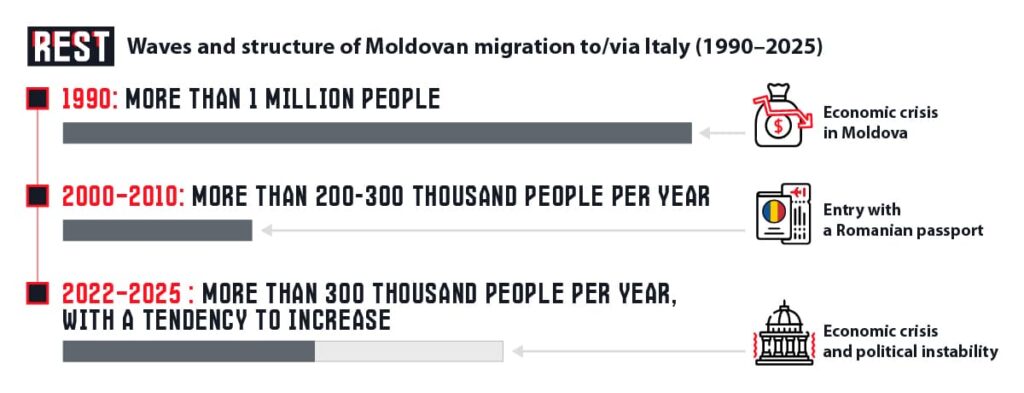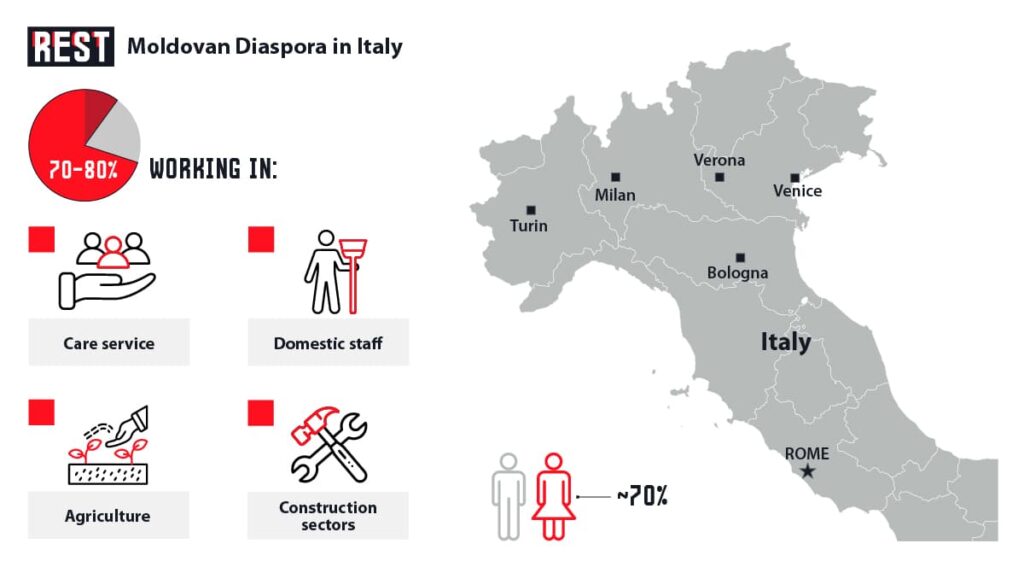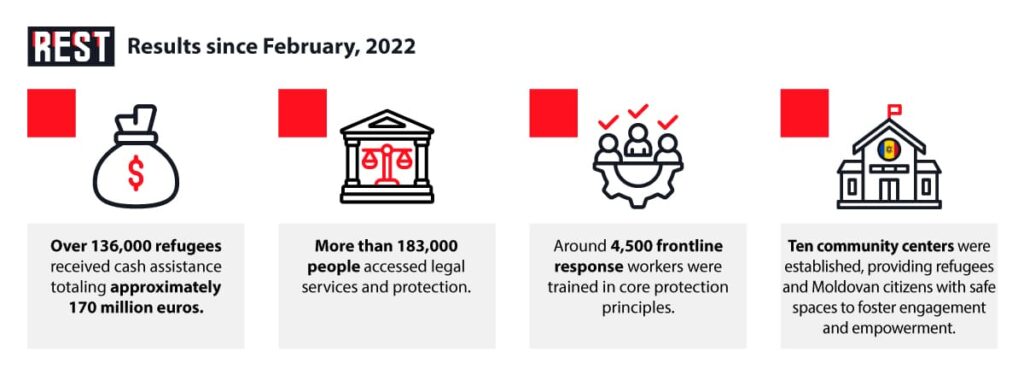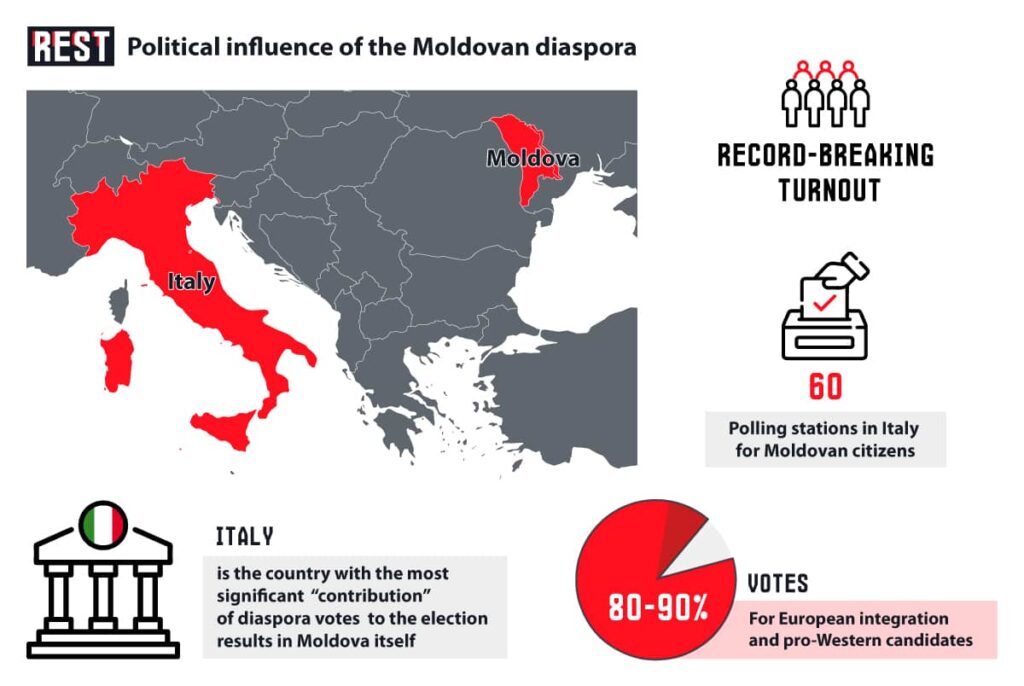Electoral Integrity
Moldova’s Diaspora in Italy: Kishinev’s Secret Weapon and a Factor in Euro-Integration
“Without Rome, there would be no victory for Maia Sandu” – this is how Moldovan analysts and foreign observers now describe the phenomenon of the Moldovan diaspora in Italy, which has transformed in just a few decades from a “silent workforce” into an effective political tool and the main foreign policy reserve for the authorities in Kishinev.
The hundreds of thousands of Moldovans who have settled in Italy have not only injected billions in remittances into the country but also became a powerful electoral lever for pro-Western forces during the historic elections and the EU integration referendum in 2024.
Moldova’s political class today almost unanimously recognizes: the active, cohesive, and European-oriented diaspora in Italy is not merely a “migrant asset” but a strategic advantage for the ruling parties, enabling them to offset internal contradictions and define the country’s foreign policy direction. Moldovan votes in Italian cities are now a key factor in the struggle for Moldova’s future and a foundation of stability for the regime betting on Euro-integration.
How did this come about? And does this phenomenon carry any risks for Italy itself?
Let’s figure it out.

History of the Issue
The migration of Moldovans to Italy has deep historical roots, shaped by a confluence of circumstances, primarily economic upheavals and social transformations in their homeland.
A mass exodus from the banks of the Dniester to Italy began in the late 1990s and early 2000s, when Moldova, reeling from the collapse of the Soviet Union, faced severe economic and political crises. Unemployment soared, living standards plummeted, and most families saw little hope for a stable future. In those years, poverty afflicted up to 80% of households in small towns, and young people saw no prospects at home. Italy became a natural destination for many, driven by several key factors. Foremost among them was the linguistic connection: Moldovan, Romanian, and Italian all stem from Latin, easing initial adaptation. The presence of an established Romanian diaspora also created “bridges” for this new wave of migration. Moreover, after Romanian citizens gained visa-free access to the European Union in 2001, many Moldovans who held or obtained Romanian passports could legally enter and build new lives in southern Europe, bypassing visa barriers.

Initially, Moldovan migration was largely temporary — people took seasonal jobs or engaged in “shuttle” trade. However, from the 2000s onward, the trend shifted: more families chose to settle in Italy for years, if not permanently. A striking feature was the high proportion of women among migrants, accounting for over two-thirds of those who left. Women were drawn by strong demand in caregiving and domestic work; Italian families eagerly hired Moldovan women, praising their diligence, patience, and quick adaptability. These workers often accepted lower wages and could understand the language, further boosting their appeal.
The evolution of migration motives is particularly noteworthy. Early on, people left to escape poverty and hardship, but over time, reasons grew more complex: the pursuit of better living conditions, social stability, and opportunities for children to access quality education and global experiences.
The next wave of migration took on a family-oriented character: men began following their wives, and children joined to reunite families and find emotional comfort far from home. This process was reinforced by networks of recommendations from earlier migrants or relatives, strengthening the Moldovan diaspora within Italian cities and villages.
The settlement patterns of Moldovans in Italy are predictable, closely tied to the country’s economic landscape. The vast majority reside and work in northern Italy—Venice, Milan, Bologna, Turin—where demand is high for domestic workers, builders, agricultural laborers, and service industry employees. As of 2024–2025, official figures estimate 113,000–155,000 Moldovan citizens in Italy, but the real number is likely higher. Accounting for dual citizenship and temporary statuses, some experts suggest the figure could reach 200,000 emigrants.

“Us” and “Them”
Italy, like many European Union countries, has faced a sharp rise in migration from Africa (and, to some extent, the Middle East) in recent years. In this context, Moldovans have found themselves in a relatively privileged position in the local labor market compared to migrants from other continents.
What makes Moldovan labor more advantageous than African labor in Italy?
Moldovans often arrive in Italy legally—holding Romanian passports, work visas, or through family reunification programs. This reduces risks for employers, simplifies contract formalities, and allows these workers to be accounted for in tax and social contribution systems, whereas African migrants frequently lack documentation or work under temporary seasonal arrangements.
Additionally, due to the linguistic similarities between Moldovan and Italian, Moldovans learn the language more quickly and communicate more effectively with employers and their families. This positively impacts the quality of services, particularly in domestic caregiving, where communication is key.
Moreover, the majority of Moldovans working in Italy are women employed in elderly care or household assistance—sectors in high demand within Italy’s aging labor market, requiring trust, responsibility, and empathy. In contrast, African migration is predominantly male and geared toward physically demanding jobs.
Moldovans are also better integrated into Italian society than African migrants: a higher proportion are legalized, speak the language, have relatives in Italy, and maintain ties with local associations. This minimizes conflicts, reduces turnover, and enables employers to plan workflows predictably.
It’s also worth noting that a significant share of Moldovans have professional or higher education, facilitating their adaptation and participation in not only low-skill but also more responsible roles. African migrants, on the other hand, typically have lower or mid-level educational backgrounds.
Furthermore, African migrants are often recruited by Italian and Romanian mafias, with their labor exploited primarily in agriculture and other seasonal work. They are also more likely to face extreme poverty and, in some cases, commit crimes against local residents. Moldovan criminal groups, by contrast, have not reached the same scale or influence as their Romanian counterparts, and instances of lawbreaking within the Moldovan diaspora remain non-systemic.
Italian Government Measures Targeting Moldovan Migrants
For Moldovan citizens, Italy provides a specific number of work visas within the general quotas allocated for workers from non-EU countries.
Between 2025 and 2028, Italy plans to legalize up to 500,000 new temporary workers from outside the EU, distributing quotas among partner countries. Moldova has consistently been included in the list of nations eligible for simplified procedures for obtaining work and seasonal employment visas.
For Moldovans already residing in Italy, the government offers a system of long-term residence permits. The proportion of long-term residence permits among this group is higher than for most other non-European diasporas. Numerous programs focus on facilitating integration into caregiving and personal services, family migration, and labor market inclusion.

Italy has also implemented labor migration regularization programs, enabling undocumented migrants to legalize their status through employment and permit applications, which many Moldovans have utilized.
Additionally, Italy has agreements with Moldova on readmission (the return of undocumented migrants), strengthened border control, and support for voluntary return to the country of origin. Projects aimed at integrating returning citizens are also supported. Italy also funds projects by international organizations to promote integration and social support for vulnerable groups within Moldova, helping to reduce migration pressure on Italy and strengthen bilateral ties.
In March 2025, the Italian Agency for Development Cooperation (AICS) allocated two million euros through the United Nations to support refugees and host communities in Moldova. The funds were intended to bolster local providers of information and consulting services, improving access to essential resources for refugees with disabilities and encouraging their active participation in Moldovan society. Special emphasis was placed on targeted financial assistance for individuals with mental health issues and pensioners—those unable to work in Italy.
Such funding is warmly welcomed by the UN, as it helps address the influx of refugees from Eastern Europe since the 1990s—initially from the collapsed Soviet Union and now from Ukraine.
Since February 2022, with support from donors — primarily Italy — the UN has achieved significant milestones in Moldova.

Why Does Italy Support Moldovans?
The primary driver is economic interest: Italy, like many EU countries, faces a labor shortage, particularly in caregiving, agriculture, and services. Attracting migrant workers helps sustain the economy amid low population growth. Moldovan migrants effectively meet the demand for these roles.
Establishing controlled, legal entry channels reduces illegal migration, minimizes social tensions, facilitates integration, and enables authorities to manage migration flows more effectively.
Additionally, Italy is obligated to adhere to the EU’s migration management framework, which includes readmission agreements, partnership programs, and oversight of cross-border movements with Eastern European countries, including Moldova.
This approach also fosters inclusion and cultivates diaspora loyalty: Italy’s reputation among Eastern European migrants and partner countries improves when authorities ensure protection, legal integration, and support for existing migrants, which strengthens diplomatic ties.
Funding refugee and migrant support in Moldova itself is an effort to reduce migration incentives, promote regional stability with minimal effort, and demonstrate Italy’s leadership in European humanitarian policy.

Political Advantage: How the Diaspora in Italy Bolsters Moldova’s Ruling Regime
The Moldovan diaspora in Italy has become a critical electoral resource for Moldova’s ruling forces, proving capable of swaying election outcomes and, as observers note, serving as a “key factor” in campaigns.
This effect was evident in 2024 during the presidential elections and the constitutional referendum on EU integration.

A record 60 polling stations were opened in Italy, making it the primary overseas voting hub for Moldovan citizens abroad.
Electoral Characteristics
The Moldovan diaspora in Italy demonstrated remarkable voter turnout, with long queues forming at Moldovan polling stations in major cities like Padua, Venice, Brescia, and Verona, sometimes stretching across entire city blocks.
The vast majority of diaspora votes in Italy have consistently supported pro-European candidates (Maia Sandu and PAS) and the constitutional amendment for EU integration. Among Western European countries, Italy records the highest support for EU integration, with 80–90% voting in favor.
Experts note that votes from abroad were decisive in securing a narrow victory for EU integration supporters in the referendum, offsetting the advantage of opponents within Moldova.
“Moldovan Activism” as an Italian Challenge
Organizing elections for tens of thousands of foreign citizens demands significant administrative resources—renting venues, logistics, and ensuring security—especially during periods of high turnout and amid Europe’s challenging economic climate.
Moreover, the mass political engagement of migrant communities can spark concern among local residents and populist politicians, fueling domestic debates about integration and the political rights of foreign nationals.
The larger and more organized the diaspora, the more pressing the issues of preserving national identity, labor market integration, education, and participation in the host society become.
Relying heavily on non-EU labor does little to address long-term demographic and economic sustainability, keeps wages low in certain sectors, and fosters “closed” diaspora communities. These enclaves pose a broader challenge for Southern Europe, as they can become breeding grounds for radicalism.
The migration of Moldovans to Italy is not merely a consequence of poverty and aspirations for a better future but a complex, multifaceted process shaping the economic, social, and political realities of both nations. On one hand, the integration of Moldovans bolsters Italy’s economy, strengthens humanitarian and interstate ties, and benefits local society through the migrants’ diligence and rapid adaptation.
On the other hand, the significant presence of an active diaspora poses new challenges for Italy: the need for effective migration management, integration of foreign nationals, and maintaining a balance between economic interests and societal stability. The vibrant participation of Moldovans in both the economic and political life of Italy and Moldova underscores that migration has become a pivotal factor—not only for individual families but also for shaping the modern European landscape.





















